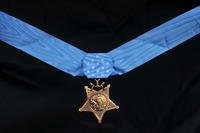In July 1940, things looked bleak for the British. France, Belgium, the Netherlands, Denmark and Norway had fallen to the German war machine, rationing of food and other goods was instituted and Allied forces were forced to withdraw from the beaches of Dunkirk.
All hope was not lost. In May, a new prime minister had taken power in London, one who would not appease Nazi Germany nor accept any talk of surrender. After the fall of France, Winston Churchill famously said: “The 'Battle of France' is over. I expect that the Battle of Britain is about to begin."
He was right. In order to successfully launch Operation Sea Lion, the German invasion of Britain, Hitler needed the English Channel cleared of Royal Navy ships and the skies free from interference by the Royal Air Force. He would get neither.
From July through October 1940, RAF pilots engaged the German Luftwaffe over the skies of England, both by day and by night. Luftwaffe commander Hermann Göring’s plan was to first destroy the RAF, either in the skies or on the ground while targeting British aircraft production facilities. He wanted to end RAF bombing runs on Germany while blocking British ports from the air.
With the Royal Air Force out of the way, Göring then would order the destruction of military and economic targets throughout the United Kingdom, completely unopposed. The British had a shortage of skilled pilots, but international volunteers from at least 14 countries weren’t going to let the Germans have their way. Outmanned and outgunned, the RAF and its civilian ground spotters fought on for months.

More than 1,500 British and Allied airmen were killed in the fighting, and the RAF lost more than 1,740 aircraft. Even after terrorizing British citizens by bombing London and other major cities nightly during “The Blitz” of 1940-1941, the Germans did not achieve superiority by air or by sea, and Britain lived to continue the fight to free Europe from the Nazi stranglehold.
Now, every September, the Royal Air Force -- along with American fighter units who served as volunteers during the Battle of Britain -- commemorate the victory with the ritualistic burning of a wooden piano. The piano is delivered in a ceremony, often ceremoniously hacked to pieces by airmen wielding axes and sledgehammers. Then, it’s set ablaze.
No one knows for sure how the tradition started. Some believe that the shortage of gentlemanly pilots led the RAF to recruit men who weren’t considered “gentlemen” at all. These pilots were forced to take piano lessons so they could earn the title. At the first opportunity, these stressed-out pilots were said to have burned the piano. No piano, no lessons, just air combat.

A more likely explanation, according to one Air Force historian, says that a group of RAF pilots were entertained nightly by one of their own who was an exquisite pianist. After one particularly brutal mission over the skies of England, their beloved melodic wingman did not return. The pilots, knowing the piano never again would play the music they loved so dearly -- and that their comrade never would be replaced -- burned it.
This is the most likely explanation, because it reflects what the modern piano-burning ceremony is actually about: remembering those who fought and those who died during the Battle of Britain and to honor the sacrifices made by all those who kept Britain for the British people.

-- Blake Stilwell can be reached at blake.stilwell@military.com. He can also be found on Twitter @blakestilwell or on Facebook.
Want to Learn More About Military Life?
Whether you're thinking of joining the military, looking for post-military careers or keeping up with military life and benefits, Military.com has you covered. Subscribe to Military.com to have military news, updates and resources delivered directly to your inbox.
















